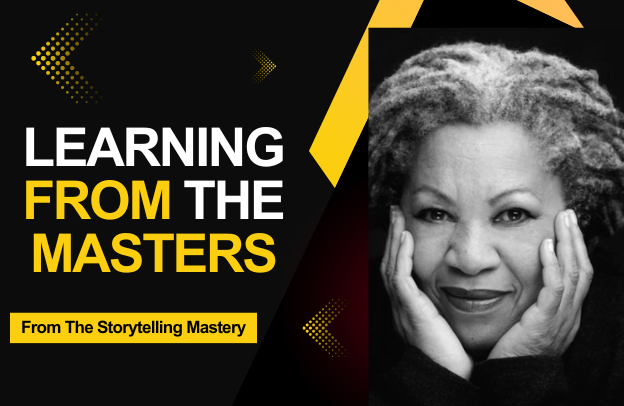5 Lessons About Positive Thinking And How To Apply Them In Your Personal Life

Living in today’s fast-paced world, where technological advancements and the constant stream of information can feel overwhelming, positive thinking can offer a refuge and a guide for navigating life’s challenges. That is what we are going to be talking about today as we explore five key principles of positive thinking and how they can be applied to improve our lives.
Want to learn more about storytelling? Start by downloading the first chapter of The Storytelling Mastery.
Lesson 1. Mental Resilience: Fortifying the Mind Against Adversity
Positive thinking is a powerful tool for building mental resilience, enabling individuals to navigate life’s challenges with strength and grace.
Ancient Stoic philosophers like Epictetus and Marcus Aurelius emphasized the importance of maintaining a positive mindset in the face of adversity. The Stoics believed that while we cannot control external events, we can control our reactions to them.
This mindset fosters an inner strength that allows individuals to remain calm and composed, regardless of the circumstances. If you think about it, that is the position of power.
It’s good also to note that contemporary psychology supports the Stoic view, highlighting that a positive outlook can enhance an individual’s ability to cope with stress and recover from setbacks.
See also 7 Stoic Practices for a Better Morning Routine
This happens because positive thinking encourages a solution-focused approach, allowing individuals to see opportunities where others see only problems. This resilience is crucial in today’s ever-changing world, where challenges can arise unexpectedly.
Here are some Practical Tips:
- Cultivate Gratitude: Regularly reflecting on the things you are grateful for can shift your focus from what is lacking to what is abundant in your life. Keep a gratitude journal and write down three things you are thankful for each day.
- Practice Mindfulness: Engage in mindfulness practices such as meditation to center your thoughts and reduce stress. Mindfulness helps you stay present and avoid dwelling on negative past experiences or worrying about the future.
- Reframe Negative Experiences: View challenges as opportunities for growth. When faced with a difficult situation, ask yourself what you can learn from it and how it can help you become stronger.
Lesson 2. Physical Well-being: The Mind-Body Connection
The benefits of positive thinking extend beyond the mind, significantly impacting physical health and overall well-being.
Traditional Chinese medicine and Ayurvedic practices have long recognized the link between a positive mindset and physical health. These ancient systems of medicine emphasize balance and harmony, suggesting that a healthy mind contributes to a healthy body.
Scientific research indicates that positive thinking can lead to lower levels of stress, reduced risk of chronic diseases, and increased lifespan. Studies have also shown that individuals with a positive outlook are less likely to suffer from conditions such as hypertension, cardiovascular disease, and even the common cold.
See also 10 Stoic Lessons: How To Find Inspiration In For Your Daily And Living Life To Its Fullest
The mind-body connection is a powerful testament to how our thoughts can influence our physical health.
Some Practical Tips:
- Engage in Regular Physical Activity: Exercise releases endorphins, which are natural mood boosters. Aim for at least 30 minutes of moderate exercise most days of the week.
- Maintain a Balanced Diet: Eating a diet rich in fruits, vegetables, and whole grains can improve your mood and energy levels. Avoid excessive sugar and processed foods, which can lead to mood swings and fatigue.
- Surround Yourself with Positive Influences: Spend time with people who uplift and support you. Positive social interactions can reduce stress and contribute to overall well-being.
Lesson 3. Enhanced Relationships: Building Stronger Social Connections
Positive thinking fosters healthier and more fulfilling relationships by promoting empathy, understanding, and effective communication.
Confucianism and other ancient philosophies highlight the role of positive interpersonal interactions in creating harmonious societies. Confucius taught that benevolence, respect, and empathy are essential for maintaining healthy relationships and a stable society.
Now there is something to be pointed out here – positive thinkers are more likely to build and maintain strong, supportive relationships than those who are not. Note also that a positive attitude can improve communication, increase empathy, and reduce conflict, all of which are crucial for building lasting connections.
Studies have shown that people who think positively are more likely to have satisfying relationships, both personally and professionally. S, learn to build up your positive thinking mindset.
Here are some Practical Tips:
- Practice Active Listening: When engaging with others, listen attentively and without interruption. Show empathy by acknowledging their feelings and perspectives.
- Express Appreciation: Regularly express gratitude and appreciation to those around you. A simple “thank you” can strengthen bonds and foster mutual respect.
- Approach Conflicts with a Solution-Oriented Mindset: When disagreements arise, focus on finding a resolution rather than assigning blame. Work together to find common ground and solutions that benefit all parties.
Lesson 4. Personal Fulfillment: Achieving Goals and Realizing Potential
A positive mindset is a critical factor in achieving personal and professional goals, leading to a more fulfilling life.
The teachings of Aristotle and other philosophers underscore the importance of positive aspirations and virtuous living for achieving eudaimonia, or true happiness. Aristotle believed that living in accordance with virtue leads to a fulfilling and meaningful life.
Developing positive thinking is known to enhance motivation, creativity, and perseverance, which are key traits for personal and professional success. This is because, by maintaining a positive outlook, individuals are more likely to set ambitious goals, remain committed to their pursuits, and overcome obstacles.
See also Learning How To Master Mindset And Motivation For Entrepreneurs With Katrina Morris
This mindset helps to unlock potential and achieve a sense of fulfillment.
Here are Practical Tips to adopt:
- Set Realistic Goals: Break down large goals into smaller, manageable tasks. This makes it easier to track progress and maintain motivation.
- Visualize Success: Spend time visualizing your goals and the steps needed to achieve them. This can create a mental roadmap and increase your confidence.
- Maintain Positive Self-Dialogue: Replace negative self-talk with positive affirmations. Remind yourself of your strengths and past successes to build confidence.
Lesson 5. Societal Impact: Creating a Culture of Positivity
Remember that positive thinking can transform not just individuals, but entire communities, thereby fostering a culture of optimism and collective well-being.
Many ancient societies thrived on collective positivity and shared values. Indigenous cultures and classical civilizations often emphasized community, cooperation, and shared prosperity.
These cultures understood that a positive collective mindset could lead to societal progress and stability.
A community-oriented positive mindset can lead to increased social cohesion, lower crime rates, and overall societal progress. Positive thinking at the community level encourages collaboration, innovation, and mutual support.
When communities embrace positivity, they become more resilient and capable of addressing social challenges.
See also Unlock The Influence of Positive Thinking Harnessing the Power of Your Thoughts with Melvinia Ford
What can you do to cultivate positive thinking? Consider the following tips:
Practical Tips:
- Engage in Community Service: Volunteering and helping others can create a sense of purpose and strengthen community bonds. Look for local opportunities to contribute your time and skills.
- Promote Positive Media: Support and share media that highlights positive stories and solutions. This can shift the collective focus towards optimism and potential.
- Encourage Inclusive and Supportive Environments: Foster environments where everyone feels valued and included. Encourage open dialogue, celebrate diversity, and provide support for those in need.
Conclusion: Embracing Ancient Wisdom for a Brighter Future
The principles of positive thinking, deeply rooted in ancient wisdom, offer invaluable guidance for navigating the complexities of modern life. By embracing these timeless teachings, we can enhance our mental and physical health, build stronger relationships, achieve our goals, and contribute to a more positive and harmonious society.
In doing so, we honor the legacy of our ancestors while paving the way for a brighter future.
Want to learn more about storytelling? Start by downloading the first chapter of The Storytelling Mastery.





